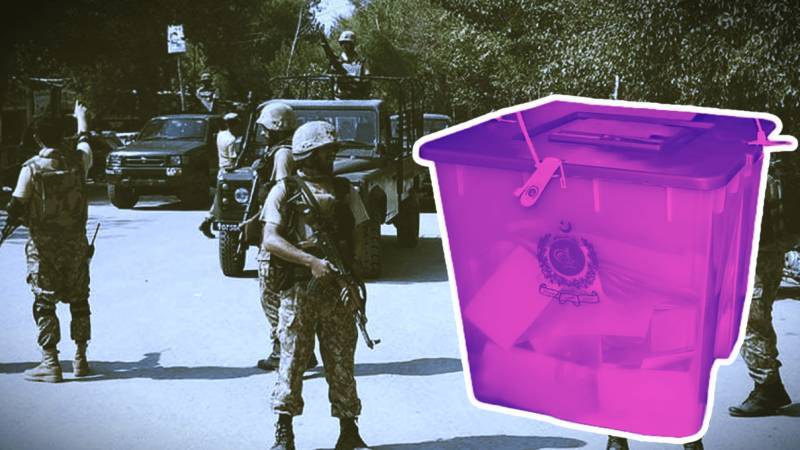
As Pakistan braces itself for the upcoming elections, the nation is delicately navigating a complex web of security concerns, overshadowed by the persistent threat of terrorism. The security landscape presents a formidable challenge for both political parties and the general public actively involved in the electoral process and campaign activities.
Despite commendable progress made against certain militant groups in recent years, the specter of renewed violence looms large. Specifically, the threat emanates from entities such as Tehreek-e-Taliban Pakistan (TTP) and the Islamic State's Khorasan Province (IS-KP, also known as Daesh), both of which pose ongoing challenges to the nation's security.
Numerous assaults have been orchestrated against prominent political figures, including Mohsin Dawar, as well as various JUIF candidates in Khyber Pukhtunkhwa and politicians in Baluchistan who were specifically targeted by Baloch separatists in the lead-up to elections. In addition to these attacks, the Counter Terrorism Department has recently asserted that the upper echelons of the JUIF and ANP face a heightened risk of being targeted by militant outfits.
Despite the fact that the security situation nationwide falls short of being exemplary, as evidenced by the recent threat alert issued to educational institutions in Islamabad, the most pressing concern lies in Khyber Pakhtunkhwa (KP), where the presence of militant groups is notably pronounced.
This isn't the inaugural instance of electioneering facing formidable challenges due to security threats. The electoral contests of 2008 and 2013 presented substantial security hurdles, particularly for ANP and PPP, particularly in the regions of Khyber Pakhtunkhwa and Karachi. During those periods, these two political entities found themselves practically expelled from the election campaigns. Certain observers went as far as to allege that policymakers at that time deliberately targeted these parties, aiming to create conditions conducive to the victory of a specific political party.
Despite the fact that the security situation nationwide falls short of being exemplary, as evidenced by the recent threat alert issued to educational institutions in Islamabad, the most pressing concern lies in Khyber Pakhtunkhwa (KP), where the presence of militant groups is notably pronounced. While the TTP has consistently emphasized its primary focus on security agencies in recent years, experts maintain that the group is not averse to targeting specific political figures who openly challenge its ideology. This is especially true for those who oppose the TTP's stance on the irreversible merger of the Former Federally Administered Tribal Areas (Ex-FATA).
Maulana Fazal's recent trip to Afghanistan was a strategic move to persuade Afghan leadership to restrain the TTP from launching attacks on him and his party during the upcoming elections. Unfortunately, his efforts proved futile as he failed to secure any commitment from the Afghan Taliban. Instead, he was informed that the matter was considered an internal issue and the Afghan Taliban declined involvement. The intricate dynamics between political figures, militant groups, and cross-border influences underscore the intricate challenges faced in managing security concerns in the lead-up to the elections.
While the Tehreek-i-Taliban Pakistan (TTP) or the Hafiz Gul Bahadur group may tailor their targets to politicians openly opposing them or those accused of collaborating with security agencies against their interests, the threat from Baloch separatists is largely confined to politicians closely aligned with Islamabad. In contrast, the menace posed by the Islamic State Khorasan Province (ISKP or Daesh) is deemed more ominous. Although their attacks have been concentrated in the Bajaur area against JUIF, experts caution that this extremist group may pose a broader threat to all political parties. The ISKP rejects the principles of democracy and draws inspiration from transnational khilafat movements, making them potentially hostile to the entire political spectrum.
The precarious state of the security situation becomes even more pronounced with the incessant issuance of government threat alerts, cautioning against potential terrorist attacks specifically targeting prominent politicians.
While strides have been taken to address and curb the influence of these militant groups, the ever-present danger necessitates heightened vigilance from security forces and the citizenry alike. The potential for renewed activities by TTP and IS-KP demands a sustained and adaptive approach to ensure the safety and integrity of the electoral process.
The precarious state of the security situation becomes even more pronounced with the incessant issuance of government threat alerts, cautioning against potential terrorist attacks specifically targeting prominent politicians. This persistent threat not only heightens the vulnerability of those immersed in the political sphere but also raises profound concerns regarding the overall safety and integrity of the impending electoral process.
In this challenging backdrop, the forthcoming elections emerge as a litmus test of resilience for both political entities and the public. The intricate task at hand involves striking a meticulous balance between nurturing democratic participation and ensuring the safety of citizens, a balance that is of paramount importance. The ever-evolving dynamics of security demand a nuanced, comprehensive, and adaptable approach from authorities to shield the democratic process from the looming specter of terrorism.
Compounding these challenges is the reluctance of leading political figures to actively participate in the election campaign, stemming from genuine and serious security threats against them. This factor, among others, has contributed to a noticeable lack of public interest in the electoral proceedings. The absence of influential political figures not only hampers the vibrancy of the democratic dialogue but also underscores the critical need for enhanced security measures to encourage the active involvement of political leaders and, by extension, the general public in the electoral process.
Addressing this multifaceted challenge requires a concerted effort to create a secure environment that not only protects political figures but also instills confidence in the public, rekindling their interest in the democratic exercise unfolding before them. Only through such measures can the delicate balance between security imperatives and democratic participation be effectively struck, ensuring the legitimacy and inclusivity of the electoral process.

